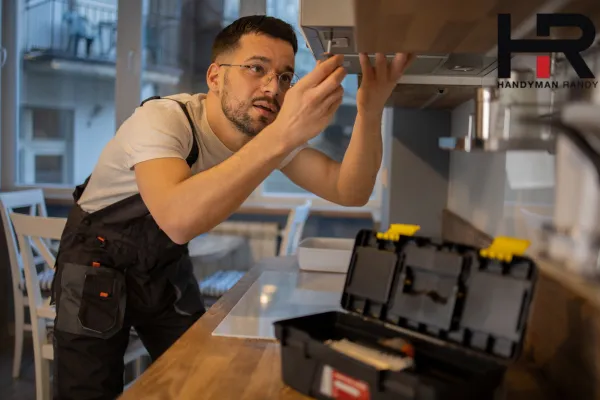Blogs

Should You Hire a Handyman or Specialist? Find Out Now
Homeowners face a tough question every time something breaks or needs an upgrade: Should You Hire a Handyman or Specialist? Some jobs seem simple, but others get tricky fast. This guide will help you understand the key differences so you can find the right professional for the work without wasting time, money, or risking your home.
What Does a Handyman Do?
A handyman is someone who handles a wide range of small jobs and general home maintenance tasks that don’t require a license. Think of them as your go-to helper for things that aren’t overly technical but still need attention.
Handyman services typically include:
Drywall repairs
Fixing a leaky faucet
Furniture assembly
Hanging shelves
Swapping out light fixtures
Minor electrical work
Weather stripping windows
Basic carpentry
A great handyman is versatile and can tackle many small tasks in one visit. If your to-do list has a little of everything, they can often get it all done quickly. That's why homeowners rely on companies like Handyman Randy, known for dependable and affordable handyman services for home projects that don’t require permits or special training.
Whether you’re a busy homeowner or managing a rental property, having trusted handypeople like Handyman Randy nearby can save you time and headaches.
When to Hire a Handyman for Home Projects
1. Basic Fixes
When you're dealing with simple home repair jobs like drywall patching, loose cabinet hinges, or hanging shelves, it's best to hire a handyman. These small jobs don’t require licensing or formal training.
A great handyman is versatile and can tackle a variety of home projects quickly and affordably. Handyman services save you time and help avoid delays in everyday maintenance.
2. Multiple Small Tasks at Once
If you’ve got a long to-do list full of small tasks like faucet leaks, squeaky doors, or light fixture issues, call a handyman. A skilled handyperson can handle several small home repair jobs in one visit.
This saves you time and effort compared to hiring multiple specialists. Whether it's furniture assembly or touch-up painting, a handyman is the right professional for these smaller projects.
3. Saving Money on Simple Repairs
For affordable home repair, handyman services are often the most cost-effective option. They typically charge a flat rate and don’t require expensive tools or licensing. Need drywall repairs, replacing a light fixture, or sealing windows?
These small jobs can be done quickly and cheaply. If you're a homeowner looking to save money, it makes sense to hire a handyman instead of a contractor.
4. General Home Maintenance
Tasks like tightening loose doorknobs, sealing drafts, or changing air filters fall under general home maintenance. These jobs don’t require specialized training or permits, so it’s smart to call a handyman.
They help you stay ahead of repairs and prevent bigger issues later. When it comes to keeping your home in good shape, a great handyman can truly save you time and effort.
When to Hire a Contractor or a Specialist
5. Jobs Involving Plumbing, Electrical Work, HVAC, or Roofing
When the job involves complex home systems like electrical wiring, plumbing, HVAC repair, or roof repairs, you need a licensed contractor. These tasks are risky, and formal training is crucial to avoid property damage.
Whether it's an HVAC install or rewiring a room, a general contractor or electrician is the right professional. These types of repairs also often require inspections and insurance.
6. Jobs That Require Permits or Must Follow Building Codes
Larger home improvement jobs, such as kitchen remodels or structural changes, require city permits. Only a licensed contractor can legally handle jobs that require building code compliance and inspection.
This is one of the key differences in the handyman vs contractor debate. If you're unsure whether to hire a handyman or a specialist, check if the job requires legal approval or structural modifications.
7. Large or Complex Projects
Planning major renovations or a kitchen and bathroom remodel? These larger-scale projects require a general contractor who can manage plumbing, electrical, carpentry, and more. Contractors have access to a network of specialists like electricians and plumbers, and they manage the project from start to finish.
For complex jobs or full-scale remodeling, hiring a licensed and insured contractor ensures peace of mind.
8. Jobs That Need Special Tools or Equipment
Some home projects require specialized tools and equipment that a handyman may not have like tile cutters, HVAC units, or roofing tools. A licensed contractor is better prepared to handle these tasks safely and effectively.
When the job requires heavy-duty machinery or specialized work, hiring a professional with the right tools ensures the job gets done right the first time.
9. Risky or Dangerous Work
Jobs involving gas lines, roof repairs, or major electrical or plumbing work are too dangerous for a handyman. These high-risk tasks demand a licensed and insured contractor to keep your home and family safe.
If something goes wrong, a contractor’s insurance provides coverage and protects you. For your safety, it’s crucial to hire someone qualified for dangerous or technical repairs.
10. Legal Protection and Insurance
One major reason to choose a contractor over a handyman is insurance coverage. Licensed contractors carry liability insurance, which protects you if something goes wrong during a remodel or home repair.
Most handypeople don’t carry formal insurance, so homeowners may be left responsible. For large projects or risky repairs, a licensed contractor provides peace of mind and legal protection.
11. Expert Advice or Project Planning
When planning a full remodel or home addition, you need more than basic repair you need project management, permits, and inspection handling. A general contractor is a licensed professional who coordinates the work, follows building codes, and ensures each step is done right.
This is one of the key differences in whether to hire a handyman or a contractor. For big plans, go with the expert.
How to Choose the Right Professional
Getting the right person for the job can make a big difference. Choosing incorrectly can lead to property damage, failed inspection, or spending more money than necessary. A great handyman can definitely save you time, but only if the job fits within their skill set. So how do you know who to hire?
Step 1: Understand the Job Fully
Write down what needs to be done. Be clear about the size of the project and whether it involves any electrical or plumbing work, structural changes, or gas lines. A simple task like fixing a fixture is one thing, but something like a kitchen remodel or roof replacement is something else entirely.
If it’s a group of minor tasks, it’s probably perfect for a handyman like Handyman Randy. If the work is more complex or includes city permits, you likely need a licensed contractor.
Step 2: Check If a Permit Is Required
Ask yourself: Will this work require a building permit or city inspection? If yes, the job legally needs to be handled by a general contractor or licensed specialist. These pros understand building codes and will make sure the job passes city rules. If no permits are required, then a handyperson might be the better (and more affordable) choice.
Step 3: Consider Safety and Liability
If there’s a chance of injury, fire, flood, or electrical hazard, it’s better to go with someone who’s licensed and insured. Something goes wrong? Their insurance coverage protects you. Never risk safety to save a few bucks know when the job is too risky for a regular handyman.
Step 4: Review Tools and Equipment Needed
Does the job require special tools and equipment like scaffolding, tile cutters, or HVAC gear? If yes, the job may go beyond handyman services. If the tools are basic (like drills, screwdrivers, wrenches), a handyman can likely handle it.
Step 5: Get Quotes from Several Candidates
Always get 2–3 quotes before deciding. Ask each provider what’s included, how long it will take, and if they offer any guarantees or warranties. If you're considering Handyman Randy, ask about their bundled pricing for multiple small tasks they often offer better value than hiring separate specialists.
Step 6: Match the Job to the Right Professional
After completing these steps, make your decision:
If it’s basic home repair, no permits, and safety isn’t an issue, Call a handyman.
If it’s complex home renovation, requires a permit, or involves critical systems, Hire a licensed contractor.
This process helps homeowners avoid confusion and confidently hire the right professional the first time.
FAQ
Can a handyman do plumbing or electrical work?
A handyman can do basic jobs like replacing a faucet or light switch. But for anything involving wiring, plumbing lines, or safety risks, you’ll need a licensed contractor to do it right.
Are handyman services cheaper than hiring a specialist?
Yes, especially for small home repair tasks. A handyman usually charges a flat rate and doesn't need special tools or permits, making it much more affordable for simple home projects.
Can I hire a handyman for more than one job?
Absolutely. A handyperson like Handyman Randy can take care of multiple small fixes during one visit. That’s convenient and can save you time compared to hiring different people.
How do I know if my job needs a permit?
If your home improvement involves structural changes, electrical work, or plumbing, you’ll likely need a permit. Check with your city or ask a general contractor to be sure.
Why is insurance important?
If a worker gets hurt or damages your home, insurance coverage protects you. That’s why hiring someone licensed and insured gives you peace of mind, especially for larger projects.
Conclusion
The right choice really depends on your home projects. If it’s small stuff like fixing a squeaky door or patching a hole a handyman like Handyman Randy is a smart and affordable option. They can handle it quickly without any hassle.
But if the job is bigger, like a kitchen remodel, major plumbing, or roof repairs, you’ll need a licensed contractor to do it safely and by the rules. Picking the right person means fewer problems and better results.
So the next time you ask, Should You Hire a Handyman or Specialist?, now you have the answer and can choose with confidence.
© 2025. All rights reserved.


